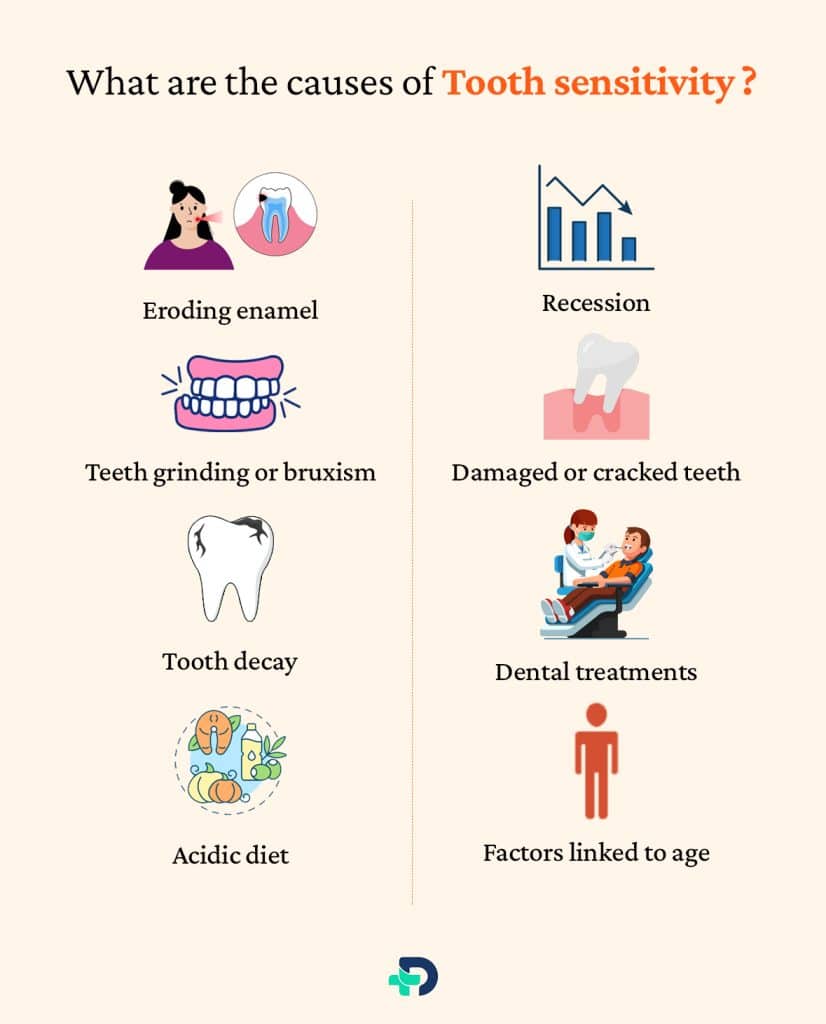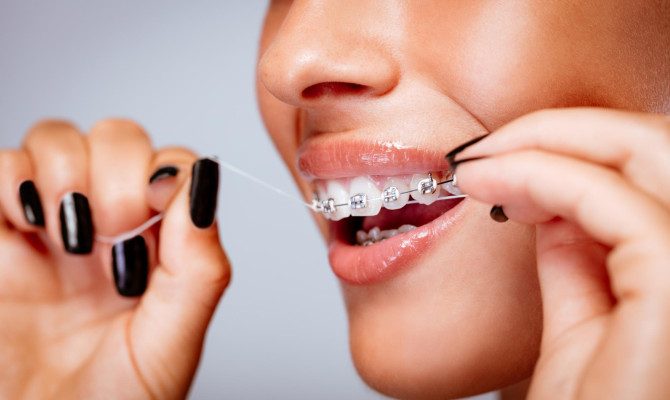Tooth Sensitivity: Causes, Treatment and Prevention

- Sensitivity
- 17 Aug 2023
Overview
What is Dental sensitivity?
A common dental condition known as dental sensitivity, also known as dentin hypersensitivity, is characterized by a sudden, sharp pain or discomfort in one or more teeth, frequently in response to specific triggers like hot or cold temperatures, sweet or acidic foods, or even simple activities like brushing or flossing. A significant fraction of the population is affected by it.1Overview| Researched based study from Nlm.nih.gov
We will delve into the complexities of dental sensitivity in this article, looking at its underlying origins, warning signs and symptoms, and several treatment options that can provide relief.

Symptoms
What are the symptoms of Tooth Sensitivity?
- Sharp, sudden pain
- Discomfort while eating or drinking
- Increased sensitivity during the oral care
- Lingering sensitivity
- Sensitivity to air or touch.
These symptoms might hurt the impacted teeth and are frequently brought on by particular triggers. Here are a few examples:
Sudden tooth pain
- This pain may seem like a shock or a shooting feeling and can be sudden, severe, and intense. Usually, particular triggers like hot or cold temperatures, sweet or acidic foods and beverages, or even exposure to air will cause it to happen.
Discomfort when consuming food or beverages
- While consuming specific meals or drinks, people may feel discomfort or pain. Ice cream, acidic fruits, hot or cold beverages, and sweet foods can frequently cause irritation and discomfort.
Increased sensitivity during the oral care
- The act of brushing or flossing can become painful. During these regular oral hygiene procedures, the bristles of the toothbrush or the floss may irritate the sensitive areas, causing pain or discomfort.1Symptoms| Researched based study from Nlm.nih.gov
Lasting sensitivity
- Even when the trigger is gone, it may still result in discomfort or pain. For example, the pain may last a while after drinking a hot beverage, even after the heat source has been cut off.1Symptoms| Researched based study from Nlm.nih.gov
Sensitivity to touch or the air
- When exposed to cold air or when the impacted tooth is touched or squeezed, certain people may experience discomfort.
One or more teeth may be affected, and the severity of the symptoms can vary.1Symptoms| Researched based study from Nlm.nih.gov
Causes

What are the causes of Tooth sensitivity?
- Tooth enamel erosion
- Gum recession
- Tooth decay
- Cracked or damaged tooth
- Teeth grinding (bruxism)
- Dental procedures
- Acidic diet
- Age-related factors
Several factors that affect the underlying dental structure can contribute to sensitivity. It is essential to comprehend the causes. Following are a few of the common reasons:
Eroding enamel
- Enamel, the tooth’s outer coating, protects the dentin and nerves underneath. However, enamel damage can be caused by vigorous brushing, acidic foods and drinks, and acid reflux.
- The dentin is exposed when the enamel erodes, making the nerves in the teeth more susceptible to stimuli.
Recession
- The tooth roots, which are not protected by enamel, are visible due to receding gums.
- Microtubules found in the tooth roots connect to the tooth’s nerve center. These tubules can send sensations to the nerves more effectively when readily available.
Tooth decay
- Sensitivity may result from cavities. The nerve may become irritated or infected as the decay advances and reaches the inner layers, causing pain and sensitivity.
Damaged or cracked teeth
- Broken or fractured teeth may expose the tooth’s inner layers or impact the nerve.
Teeth grinding or bruxism
- The enamel can become thinner and more sensitive due to frequent teeth grinding. Also, cracks or fractures may result from the high force used during grinding.
Dental treatments
- Some dental procedures, including scaling, root planing, and tooth whitening, might result in momentary discomfort. Typically, this is a temporary side effect that goes away independently.
Acidic diet
- An acidic diet with many citrus fruits, tomatoes, sodas, and sports drinks can eventually destroy the enamel.
Factors linked to age
- The enamel gradually thins as we age, and the gums may recede, increasing the teeth’ sensitivity1Causes| Researched based study from Nlm.nih.gov ,3Causes| Researched based study from Nlm.nih.gov
Diagnosis
Diagnosis of Tooth Sensitivity
Dental sensitivity can be diagnosed with a thorough dental examination, an analysis of your medical history, and perhaps further tests or X-rays.
Dental examination and evaluation of the medical history
- The mouth, teeth, and gums will all be visually inspected. They will look for any indications of dental problems such as fractured teeth, gum recession, or tooth rot.
- The dentist will ask about the precise causes of sensitivity, their frequency, length, and any events that make things better or worse.
Additional tests or X-rays
- Occasionally, additional tests may be required. These may consist of the following:
- Dental X-rays can identify underlying dental issues, including decay, fractures, or bone loss that could be the source of sensitivity.
- Transillumination shines a light through the teeth to look for fractures or breaks.
- Periodontal probing determines whether a recession is present and measures the depth of gum pockets.
- Bite analysis: To find any misalignments or bite-related problems, your dentist can check how your teeth come together when you bite3Diagnosis| Researched based study from Nlm.nih.gov
Treatment
How to treat Dental sensitivity?
Treatment approaches to deal with tooth sensitivity are as follow:
Toothpaste and mouthwash with desensitizers
- Using specially prepared mouthwash and toothpaste for sensitive teeth can be beneficial.
- These products have components that inhibit nerve impulses and offer relief, such as potassium nitrate or stannous fluoride2Treatment| Researched based study from Nlm.nih.gov
Dental sealants
- The chewing surfaces, mainly the molars, are covered with these delicate, protective coverings.
- They assist in sealing the tiny tubules in the teeth, which lessen sensitivity and act as a barrier against irritants.
Fluoridation practices
- To help strengthen the enamel, professional fluoride treatments can be administered in-office.
- Fluoride strengthens the tooth structure by re-mineralizing it, increasing its resistance to stimuli1Treatment| Researched based study from Nlm.nih.gov
Restorative dental work
- The dentist may suggest procedures like fillings, inlays, onlays, or dental crowns to repair and protect the damaged teeth if tooth decay, fractures, or other dental damage is the cause.
Gum grafts
- Gum grafting may be advised when the recession is the root of the problem. To conceal exposed teeth and lessen pain, this surgical technique involves grafting gum tissue from another location of your mouth onto the area of concern.
Dealing with bruxism
- If you grind your teeth while you sleep, your dentist may advise using a night guard. Between your upper and lower teeth, it serves as a barrier to prevent enamel wear4Treatment| Researched based study from Jada.ada.org ,1Treatment| Researched based study from Nlm.nih.gov ,1Treatment| Researched based study from Nlm.nih.gov
Prevention
How to prevent Tooth sensitivity?
Maintain a regular oral hygiene regimen.
- Use fluoride toothpaste and a soft-bristled toothbrush to brush your teeth at least twice daily. Brushing should be done gently, in circular motions, without too much pressure.
- Remember to floss daily to eliminate plaque and food particles along the gum line and between the teeth.
Use a toothbrush with gentle bristles.
- Use a toothbrush with soft bristles to prevent damaging your enamel by brushing too hard.
Eat and drink less acidic food and drink.
- Over time, consuming citrus fruits, sodas, and sports drinks, among other acidic meals and beverages, can erode the enamel.
- To reduce the exposure of teeth to acids, limit the consumption of these things and rinse your mouth with water afterward.
Keep an eye out for teeth grinding
- Consult your doctor if you frequently clench or grind your teeth.
Avoid using too much pressure when brushing.
- Too much force when brushing can cause gum recession and enamel wear, increasing sensitivity risk. Brush gently; let the bristles do the work.
A desensitizing toothpaste should be used.
- Think about including this kind of toothpaste in your dental hygiene regimen.
Go to the dentist regularly.
- Keeping your mouth healthy requires routine dental exams. Your dentist can spot any early warning signs or possible problems, offer preventive care, and give advice4Prevention| Researched based study from Jada.ada.org
Any feedback on this article?
 This Articles content was accurate
This Articles content was accurate Very Informative Article
Very Informative Article I have a question or a comment
I have a question or a comment
 This article contains inaccurate content
This article contains inaccurate content This article was not helpful
This article was not helpful I have a question or a comment
I have a question or a comment
We appreciate your helpful feedback!
Checkout our social pages
References
-
National Library of Medicine
Dentin hypersensitivity: Recent trends in management | Overview| Management | Symptoms
-
National Library of Medicine
Treating dentin hypersensitivity | Treatment
-
National Library of Medicine
Dentin Hypersensitivity: Etiology, Diagnosis and Treatment; A Literature Review | Causes | Diagnosis
-
Journal of the American Dental Association
Preventing and treating tooth sensitivity | Prevention | Treatment





































